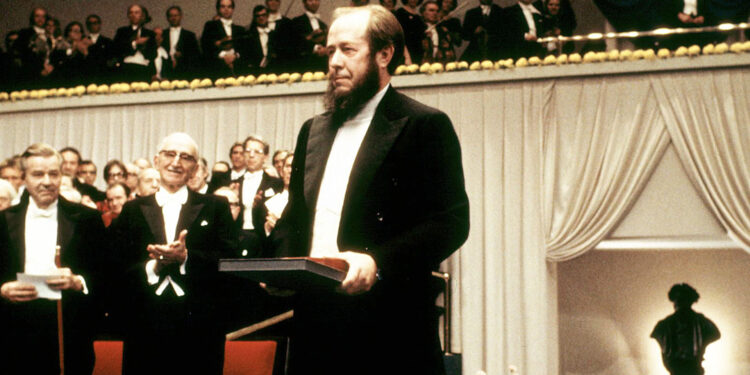Aleksandr Isayevich Solzhenitsyn (1918-2008) was a Russian novelist, historian, and short story writer who emerged as one of the most powerful voices against Soviet totalitarianism in the 20th century. His works, which exposed the brutality of the Soviet labour camp system, earned him the Nobel Prize for Literature in 1970 and cemented his place as a leading figure in the struggle for human rights and dignity.
Born in Kislovodsk, Russia, Solzhenitsyn’s early life was marked by hardship. He lost his father before birth and was raised by his mother. Despite the challenges, he excelled academically, studying mathematics and physics at Rostov State University. His education was interrupted by World War II, during which he served as an artillery officer in the Red Army.
In 1945, Solzhenitsyn’s life took a dramatic turn when he was arrested for criticizing Stalin in private correspondence. Sentenced to eight years in labour camps, followed by internal exile, this experience would become the foundation for his most famous works. In the camps, known as the Gulag, Solzhenitsyn witnessed firsthand the cruelty and inhumanity of the Soviet system.
Upon his release and subsequent rehabilitation during Khrushchev’s Thaw, Solzhenitsyn began his literary career. His first published work, “One Day in the Life of Ivan Denisovich” (1962), offered a stark portrayal of life in the Gulag and brought him instant fame. However, as the political climate changed, Solzhenitsyn faced increasing pressure and censorship.
His subsequent works, including “The First Circle” and “Cancer Ward,” were published abroad, further straining his relationship with Soviet authorities. The publication of “The Gulag Archipelago,” a detailed account of the Soviet forced labour camp system, led to his expulsion from the Soviet Union in 1974.
Solzhenitsyn lived in exile, primarily in the United States, for two decades. During this time, he continued to write and speak out against both Soviet communism and what he perceived as the moral decline of the West. He returned to Russia in 1994, after the fall of the Soviet Union, and remained an influential, albeit controversial, figure in Russian society until his death in 2008.
Aleksandr Solzhenitsyn’s life and work stand as a testament to the power of literature to bear witness to history and to challenge oppressive regimes. His unflinching portrayal of Soviet repression not only earned him the Nobel Prize but also played a significant role in awakening the world to the realities of life behind the Iron Curtain.
newshub



Recent Comments